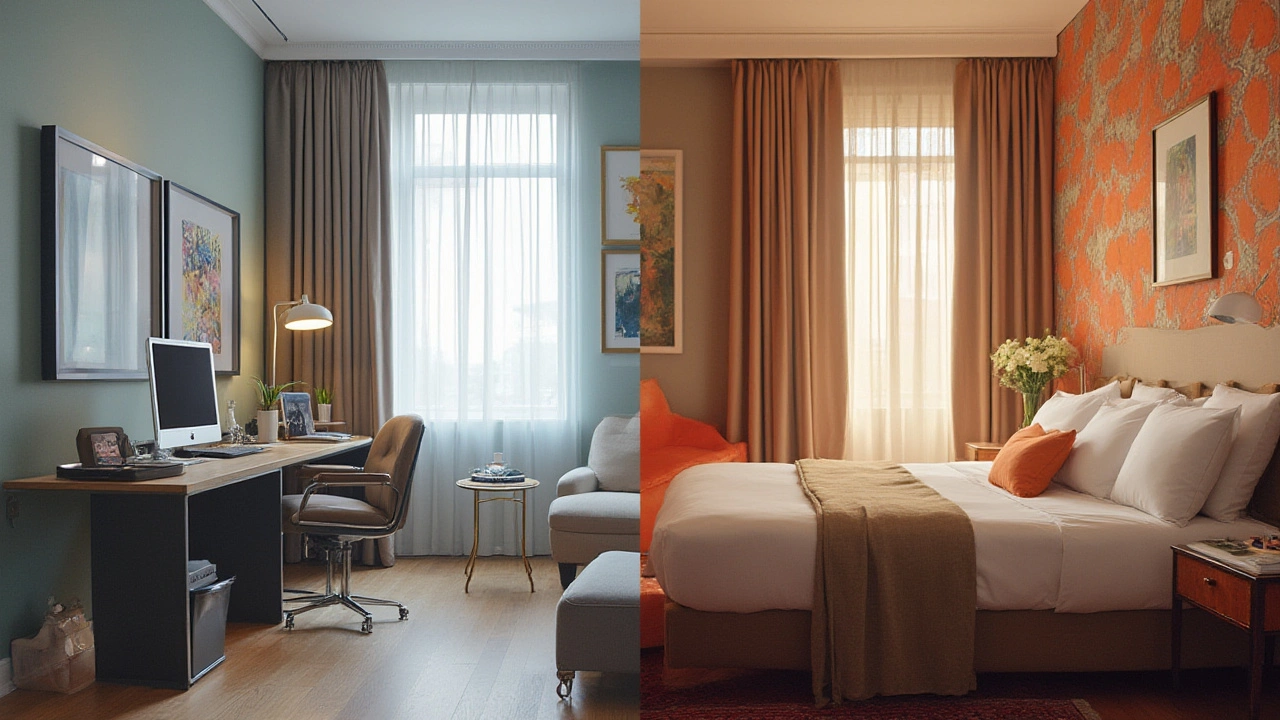Some hotels feel like they’re made just for you the moment you step into the lobby. Others? They’re a bit like airports: busy, streamlined, efficient, and familiar. Ever wondered why your work trip lodging feels like Groundhog Day, while your weekend hideaway delights you with quirky mugs and velvet pillows? It all comes down to the split between a business hotel and a boutique hotel—a surprisingly huge difference hiding in plain sight, but mostly ignored until you’re picking where to sleep next.
What Exactly Is a Business Hotel?
Business hotels are nothing if not practical. Picture your typical international hotel chain by a city airport or in a buzzing commercial zone: Hilton, Radisson, Marriott. They’re designed for people who travel for work. Not for art galleries, not for leisurely brunches—for meeting deadlines, making deals, and catching red-eye flights. The entire setup shouts efficiency. Reception’s usually humming 24/7 because travelers from all time zones keep showing up at odd hours. The check-in is fast, bordering on robotic—but after hours on a plane, that’s what tired business travelers crave.
The location of business hotels is always spot on for work, usually near financial centers, tech parks, or major conference centers. You’ll rarely need a long Uber ride to get to your morning meeting because these places are built to save you time. The design leans toward the neutral: nothing to distract you from emails or Skype calls. Lighting is ample, desks are ergonomic, and there are plenty of outlets for your pile of devices. In 2024, it’s all about F&B (food and beverage) on-the-go. The breakfast buffets open before dawn, the lobby café spits out espresso after espresso, and room service is geared for people working late. Fast WiFi isn’t a luxury here—it’s a lifeline. If you ever get stuck with slow internet in a business hotel, it’s probably headline news on TripAdvisor within hours.
What if you need to print something or run a last-minute video call? There’s always a business center for that. Sometimes “center” means a few desks with PCs and printers. Other times, it’s a corner of the lobby with giant touchscreens. Boardrooms can be booked in an instant. Meeting rooms are acoustically designed so your PowerPoint doesn’t echo to eternity. And when all you want is food without the fuss, the in-house restaurants are easy to access, serving up international fare—nothing too spicy or experimental, since jet-lagged palates and new foods aren’t always best friends.
Facilities are practical, not whimsical. The gym is usually open at 5am, and you’ll spot guests pounding the treadmill before sunrise. Laundry and dry-cleaning services are on-speed dial. There’s hardly ever a swimming pool with an infinity edge and jazz music, but seldom do you need one for a one-night layover. There’s no guessing how anything works: light switches are exactly where you expect them to be, and hotel staff often address you by ‘Mr.’ or ‘Ms.,’ sometimes with your surname—polite, but not personal.
An interesting fact: some of the world’s largest hotel groups have entire sub-brands dedicated to business travelers (for example, Hilton Garden Inn and Courtyard by Marriott both focus on the needs of the on-the-go guest). These hotels live and die by guest reviews about reliability and convenience, with loyalty programs rewarding frequent stays with perks like free upgrades and ultra-late check-outs. Packaged simplicity—that’s the business hotel secret sauce.

Boutique Hotels: Soul, Style, and Surprises
If business hotels are the efficient world of pressed suits and Decaf Americano, boutique hotels are where creativity lets loose. These spots are famous for their personality. Often, they’re independent or part of a small, tightly curated group—not a sprawling international chain. Sometimes the building itself is a story, nestled in Cape Town’s old spice trading district or squatting in Paris’ Montmartre, refusing to fit in. Every boutique hotel should feel unique, like someone poured heart and soul into the design. From locally handmade headboards to art installations by up-and-coming creators, there’s always something to catch your eye.
Step into one and you might be greeted with homemade biscuits or a glass of bubbly instead of just a swipe and a room key. Don’t be shocked if the receptionists remember your name after one conversation, or offer to book you the best sunset spot in the city. Staff here often act like local guides, sharing hidden gems (“Avoid Table Mountain’s queues this way!”), dinner reservations at impossible-to-book spots, or little touches like bespoke toiletries crafted by a neighbourhood apothecary.
Unlike business hotels, boutique hotels thrive on surprise. Rooms are never cookie-cutter. You could get a clawfoot tub and a balcony, or a loft with exposed brick and stacks of old records. The mini-bar? It’s probably filled with local gin and hand-roasted coffee beans instead of the standard sodas. Even breakfast is an adventure—think free-range farm eggs, warm croissants, and homemade jams instead of regular rubberized scrambled eggs. Architects and interior designers love these spaces as places to experiment—think patterned wallpaper, velvet armchairs, vintage rugs, and quirky lighting fixtures. In the best ones, every visit feels like an Instagram-ready escape.
Wellness and comfort are paramount, but in a more intimate way. Dont expect a 30-metre lap pool or a gym open at 4am, but maybe you’ll find a sundown yoga class on the roof or a morning jog led by the hotel owner. Every detail is carefully chosen for experience, not just function. Even the scent—you know when you walk into a boutique hotel because the air itself feels curated.
Boutique hotels also often lean hard on local partnerships. Their restaurants use ingredients sourced from nearby markets, their walls showcase neighborhood artists, and even the in-room guides are love letters to the city. There’s a reason why “boutique” is synonymous with “special.” If you want to feel like you’re somewhere worth remembering, this is the spot.
Insider tip: If you’re traveling for leisure, special occasions, or crave a taste of the city with every breath, book boutique. And always chat to the staff—they know spots that won’t pop up on Google, whether that’s a secret jazz club in Woodstock or a rooftop with killer ocean views.

Choosing What Suits Your Stay: Which Type Wins?
This is the million-rand question: when do you choose a business hotel, and when does a boutique haven sound more like your cup of rooibos? It’s all about what you value most from your stay. If your priority is the “triple C”—comfort, connectivity, and convenience—a business hotel is tough to beat. Business travelers swear by them: you can slide out of bed, bang out a dozen emails, change into a suit, and make it to your 7:15 meeting with time to spare. The loyalty programs also make your stay a bit sweeter with each return visit. Some frequent travelers even get free room upgrades, all because they clock enough nights on the road.
But if soul, adventure, and personal touches matter—a birthday getaway, romantic retreat, or city adventure—boutique hotels offer the magic you’ll never get from the templated experience. They often cost about the same as a good chain, but what you lose in predictability, you gain in stories and photos. These spots are for making memories. Think unexpected welcome goodies, evenings with live acoustic music in the courtyard, or that feeling that you’re discovering a secret, not just tucking in for the night.
Don’t forget custom touches that business hotels just can’t pull off. Some boutique hotels go the extra mile—even arranging off-menu candlelit dinners or surprise birthday set-ups. Ever heard of a pillow menu? Some Cape Town boutiques offer it, letting you choose everything from the fluffiness to the scent. Want fresh-cut peonies instead of standard white lilies? Just ask. This kind of experience is personal by design.
The downsides? Boutique hotels are usually smaller. This means no endless options at the breakfast buffet or massive spas with five treatment rooms. If you’re traveling in a big group, sometimes there’s not enough room for everyone (especially if a conference is rolling into town). Parking and transport might take a little more work, since they’re often in historic districts or urban nooks rather than beside wide highway off-ramps. And, yes, sometimes the unique touches can verge on the kitsch—be honest with yourself, do you really want a disco-ball in your shower after a red-eye flight?
Another tip: if you want both worlds, some business hotels are now rolling out “boutique floors” with a little extra flair, while a few boutique hotels have upped their business-friendly perks with co-working lounges and mini-meeting rooms. It’s clear the lines are blurring a bit. But the heart of each remains different: one is rooted in efficiency and scale, the other in story and soul.
To wrap it up: picture your stay. Need a place to crash, recharge, and hop out for meetings? Go business. Want to slow down, soak in the city’s mood, and snap dreamy sunrise pics from your private balcony? Give boutique a go. You’ll thank yourself for matching your mood to your room.